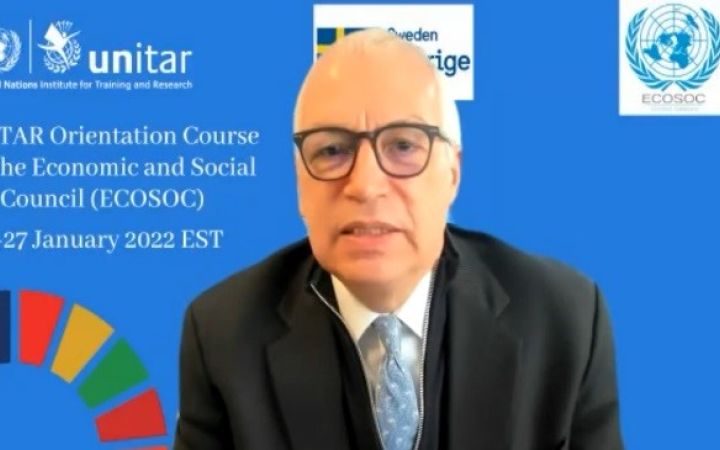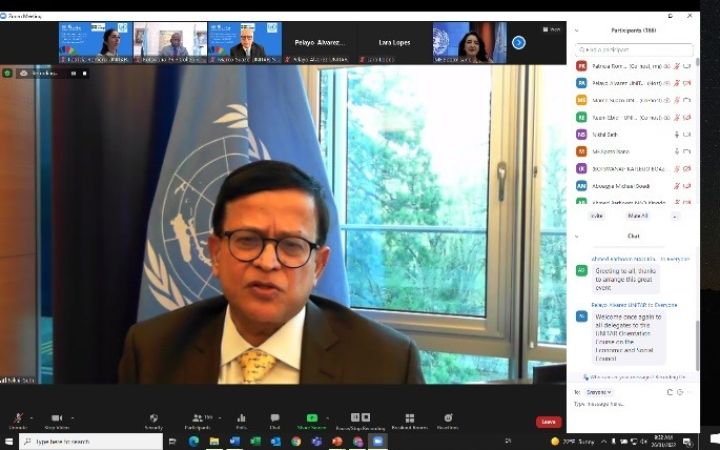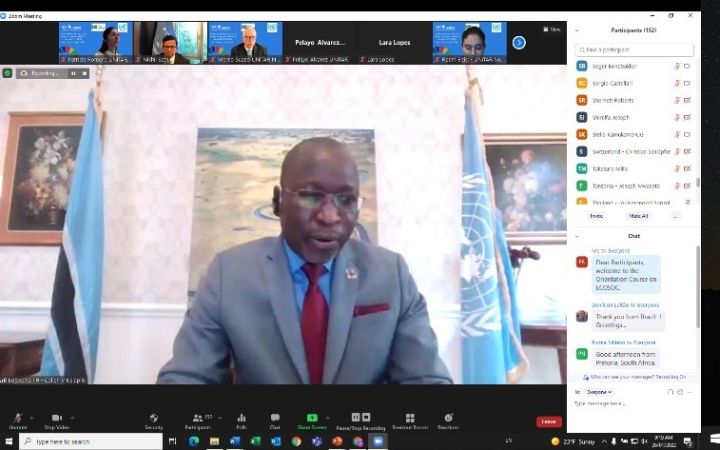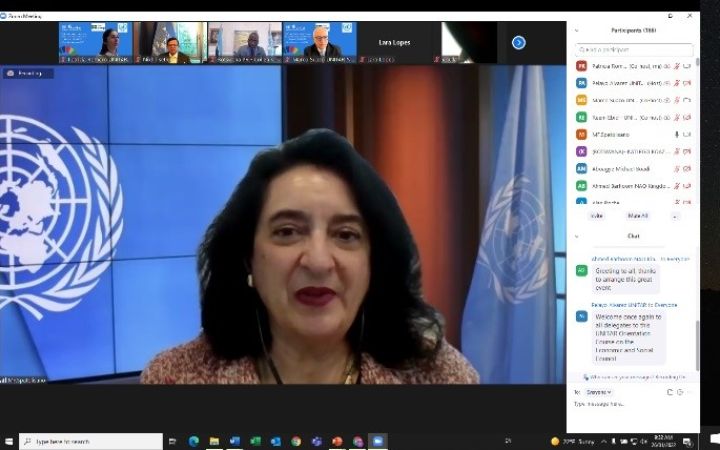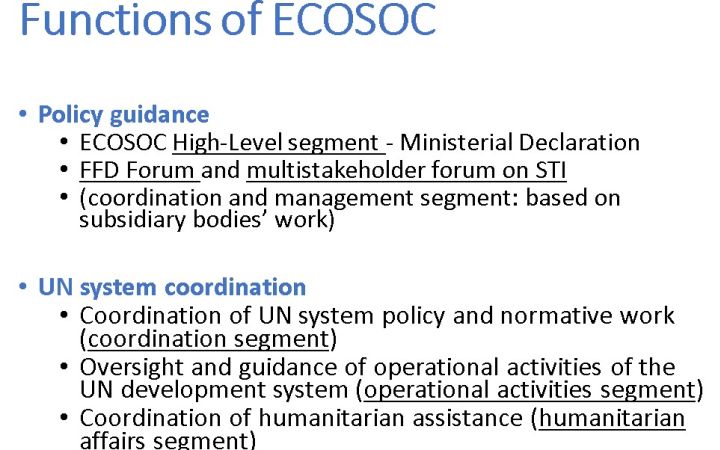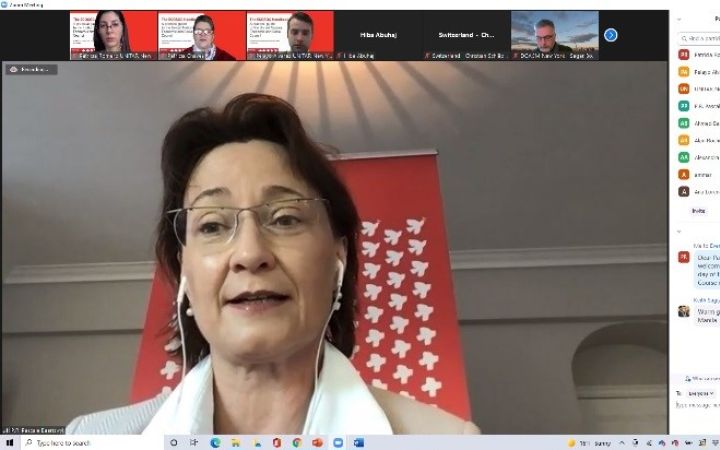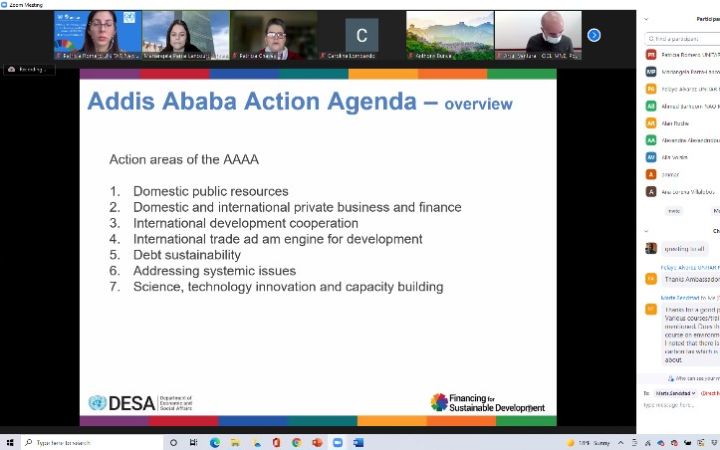26 - 27 January 2022, New York, USA by virtual.- The United Nations Institute for Training and Research New York office (UNITAR NYO), and the office for Intergovernmental Support and Coordination for Sustainable Development at the Department of Economic and Social Affairs (DESA), hosted the annual orientation course on the Economic and Social Council (ECOSOC). It took place in an online format attracting over 200 delegates and officials from Permanent Missions and the UN Secretariat, as well as officials working from capitals.
The Head of Office in New York, Mr. Marco Suazo, launched the course to advance on a profound understanding on the work of the Council. This workshop is one of the core courses of the UNITAR NYO as ECOSOC is one of the six main organs of the UN that aims to advance the three dimensions of sustainable development: economic, social and environmental. After a brief introduction, Mr. Suazo passed the floor to Mr. Nikhil Seth, United Nations Assistant Secretary-General (ASG) and Executive Director of UNITAR.
Mr. Seth described the session as a special one for him because he has been for a long time very closely associated with ECOSOC. 32 years ago, Mr. Seth came as a delegate from India to New York and the first meeting he attended was a programme on the work of the Council organized by the Second Committee. Attending the course in a different capacity, he opened it with a warm welcome to the President of ECOSOC and Permanent Representative of Botswana to the UN, H.E. Mr. Collen Kelapile, and the ASG for Policy Coordination and Inter-Agency Affairs, DESA, Ms. Maria Francesca Spatolisano.
The Executive Director reflected on the conditions of the virtual world and how it does take away the intimacy of being together in a room. He highlighted ECOSOC as the intergovernmental body with a greatest potential. It is the home for partnerships, civil society, business sector and governments, Mr. Seth said. He also encouraged delegates to utilize that potential for getting things done as demands cannot belong to governments alone. He focused his remarks on the potential that ECOSOC has.
Mr. Seth then passed the floor to the President of ECOSOC. H.E. Mr. Kelapile who welcomed delegates to prepare themselves to actively engage in delivering the important mandates of the Council. He commenced highlighting the role of ECOSOC in today’s world particularly in view of the crisis and challenges in the weak of the pandemic and its multidimensional effects. Poverty, hunger and climate change are the persistent conflicts, the President said. These situations are threatening the ability to deliver on the promise of a better life for people and reach the goals of the Agenda 2030.
H.E. Mr. Kelapile noted that, therefore, ECOSOC’s mandates are more indispensable than ever before as the world strives to recover from COVID-19 and to move into realize the sustainable development goals. He encouraged delegates to turn the wheel and make this decade one of genuine delivery. The President also suggested that the theme Building Back Better is at the heart of the lives of the people across the world as it echoes the role of Government and civil society in strengthening multilateral cooperation and international solidarity for supporting the achievement of the 2030 Agenda 2030, the Addis Ababa Action Agenda, and the Paris Agreement.
The moderator then gave the floor to ASG Ms. Spatolisano for her keynote remarks. Reflecting on current global challenges, the ASG noted that COVID-19 is withdrawing development gains, and communities are suffering at a time when cooperation is key. In her remarks, she also emphasized that during the past two years, the number of people living in extreme poverty has increased sharply and gender gap is wider. Income and wealthy inequalities within and between countries have gone up. The pandemic has delayed actions on many of the major transitions required to realize the 2030 Agenda for Sustainable Development, its 17 goals, and to overcome the climate crises.
ASG Spatolisano touched on some estimates from DESA that indicates that the world economy will grow by 4% in 2022 and less in 2023, only 3.5%. But, this recovery as good as it sounds, is still very low to new waves of Covid-19, labor-market challenges and other vulnerabilities, she stated. The rising inflation is highly affecting communities in developing countries, therefore, the continued strong commitment and sustained engagement of Member States to fulfilling the objectives of the 2030, give strong reason for hope, ASG concluded.
The moderator welcomed the following speakers and facilitators to engage in open dialogues on the sessions of the orientation course and key elements of the work of ECOSOC in 2022, namely, Ms. Marion Barthelemy and Ms. Emer Herity, Director of the Office of Intergovernmental Support and Chief of the ECOSOC Affairs Branch, respectively. In addition to sharing their insights on the role of ECOSOC, its structures and related platforms, segments, mandates, they also talked on working methods and procedures. Ms. Barthelemy elaborated about the functions of ECOSOC which since its creation, they have been both:
- Outward looking, and aimed at promoting development and international development cooperation among all countries (the slide shows its mandate)
- More inward looking and addressing coordination of UN system activities
This still characterizes ECOSOC’s key functions today, and Ms. Barthelemy described them as policy guidance, UN system coordination, guidance of ECOSOC subsidiary bodies, as well as the door for civil society to engage with the UN.
Ms. Herity provided an overview on the working methods and procedures of the Council. She highlighted reference documents for participants, two upcoming management segments during 2022, and the process which throughout the sessions, resolutions and decisions are adopted and issued separately with sequential numbering. The text of decisions adopted, and summary records are available in ECOSOC website, she added.
The programme then moved forward with interventions from different Chiefs, Directors, and Senior Officials working at the ECOSOC Branch as Ms. Irena Zubcevic, Mr. Ziad Mahmassani, Ms. Emanuela Calabrini, and Mr. Matthew Hammill. Q&A sessions took place after each session to emphasize on topics discussed corresponding to the reviewing progress to accelerate implementation of the 2030 Agenda – the high-level political forum on sustainable development (HLPF); and oversight and coordination of the UN System through ECOSOC’s operational activities segment.
Second Day of the Orientation Course
In the second and final day of the orientation course, H.E. Ms. Pascale Baeriswyl, Permanent Representative of Switzerland to the United Nations launched the ECOSOC Handbook which is a practical guide to the United Nations Economic and Social Council and a valuable resource to senior and junior diplomats. Switzerland has been a member of the ECOSOC for the past two years and has traditionally been keen to support to better working methods and effective mechanisms within the UN. The Handbook launched during the orientation course is designed to be a contribution in that same spirit.
H.E. Ms. Baeriswyl explained the reason why Switzerland had the idea to come up with a new version of the ECOSOC Handbook is because it serves as a practical guide for all delegates. It will answer questions on working methods and to make understanding easier processes within the Council. Ambassador Baeriswyl underlined that the staff from the UN Secretariat has been extremely helpful in compiling and researching on various topics for which Switzerland is very grateful.
During the progress of the course, experts from the Financing for Sustainable Development Office, Ms. Miarengela Parra-Lancourt, Ms. Caroline Lombardo, and Mr. Alexander Roehrl underscored on the mobilization of financing and technology for the implementation of the Agenda 2030. They provided information on how the forum on science, technology and innovation for the SDGs contributes to policymaking and to advance the integrated implementation of the 2030 Agenda and related agendas. They pointed that the Council offers an inclusive space to exchange experiences, knowledge, and ideas.
Interventions on ECOSOC’s role in coordinating, guiding, and addressing peace, development and humanitarian affairs were then delivered by Ms. Leslie Wade and Mr. Anton Santanen, Chief of Inter-organizational & Inter-institutional Support Branch and Humanitarian Affairs Officer, respectively. The elaborated on how ECOSOC works with the Peacebuilding Commission, General Assembly, and Security Council. Member States, through ECOSOC, addresses global emergencies, trends and challenges, humanitarian responses, and the needs of conflict-affected countries, the officials reflected.
To conclude the orientation course, Chiefs of Partnership Branch and NGO Branch, Ms. Lotta Tahtinen and Mr. Marc-Andree Dorel, respectively, and Senior Officer Ms. Patricia Chaves engaged with participants and spoke on stakeholders and forging partnerships. In this context, their interventions were timely, as these topics are top priorities that require Governments’ support in the coming years. ECOSOC serves as a big platform for civil society, youth, private sector, parliamentarians, local authorities and academics. In that sense, through ECOSOC’s various segments, partnerships and the organization of various forums are instrumental for the Council.


